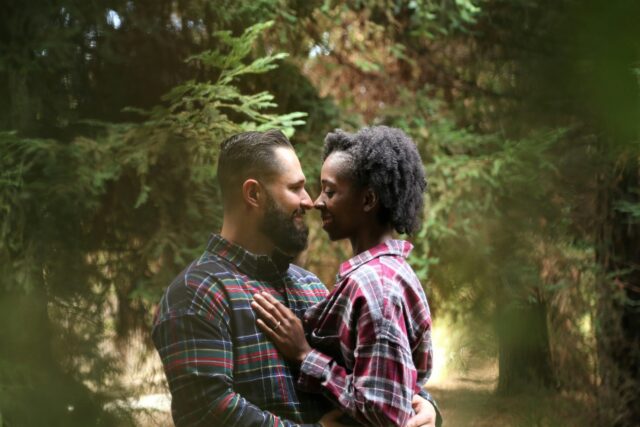When an Attitude of Gratitude Hurts
By: Natalie Rice-Thorp, Ph.D. | December 16, 2022

The holiday season is upon us, and images of seemingly blissful couples and families dressed in cozy winter sweaters are splashed across our media. These happy, “shiny” people are shown enjoying a Thanksgiving feast together, frolicking in leaves, and cuddling by the fireplace. We are encouraged to ‘count our blessings!’ and ‘be grateful’ for what we have. If you don’t associate the holiday season with happiness and joy, practicing gratitude can feel unreachable, and often painful.
There are many physical and mental health benefits to practicing gratitude, yet pressure to feel grateful can inadvertently lead us to push away other, valid emotions.
“Just be grateful that….”
Have you ever experienced a loss and been told to “Be grateful that they are in a better place,” or, that “they are no longer suffering.” You may have also heard something like “You can try for another baby/you can have other children/you can get another dog.” Sometimes well-meaning people don’t know what to say in times of grief and they blurt out these not-so-helpful statements in the hope of providing some comfort. It’s not very comforting though, is it? In fact, these types of statements feel painful and invalidating. This is because the unspoken message is to stop feeling sad, mad, jealous, or scared and only feel grateful.
These statements give the false impression that we can only think or feel one thing at a time. When we are asked to be grateful during painful times, we not only feel sad, mad, jealous, and scared, but also ashamed, embarrassed, or disappointed in ourselves.
Sometimes the speaker is you
These messages not only come from others – they can originate from within. We all have the potential for critical, negative self-talk that makes us believe what we are feeling is wrong. Your feelings are never wrong!
Be conscious of your inner voice and negative self-talk such as “ You are being a baby;” “Just get over it;” “You should be grateful;” “You are too sensitive;” and “Other people have it worse.”
“Other people have it worse…”
If you have ever said this to yourself, you are not alone. In fact, this is an especially prevalent thought we say to ourselves during challenging times. It stems from a desire to convince ourselves that “it’s not that bad,” and that we should “snap out of it.” As admirable as this motive may be, these critical thoughts make us feel worse and the strong emotions last longer.
I use the shark bite metaphor derived from teachings of action-oriented therapies like Acceptance and Commitment Therapy (ACT) and Dialectical Behavior Therapy (DBT.)
Imagine you are swimming in the ocean and -bam! – a shark attacks and bites off your arm! You swim to shore, bloody and battered, crying in pain scared out of your mind. After some time, you notice that another person has washed up on the shore and to your shock and horror, they have BOTH of their arms bitten off by the shark! You think to yourself “Stop crying, you don’t have it that bad…look at that person, they have it worse!” After some time, another person washes up on the shore, and have had both arms and a leg bitten off by the shark. The second person thinks “Stop crying, you don’t have it that bad…look at that person, they have it worse!” The scenario could go on and on indefinitely with each person having additional injuries or hardships. It would be absurd to suggest that any of the swimmers were not in pain, right? They are bleeding, they are missing limbs, they were bitten by a shark! Their pain was not lessened by other people’s pain.
We can feel grateful that we were spared additional injury and loss, but that does not mean that we not also experiencing pain and loss. Your pain is not lessened or invalid simply because others “have it worse.”
Tell the truth about your feelings
Whether it’s originating from others, or from within, when we try to “just be grateful” and suppress other valid emotions we end up feeling worse, and for longer. So, what should we do instead? The answer is to let the original, natural emotion run its natural course without judgment, and with loving kindness. You can learn How to Cultivate Self-Compassion with the support and guidance of a therapist.
Human beings are complex and capable of feeling multiple different feelings at the same time. Feelings are not an all-or-nothing experience. You are perfectly capable of feeling grateful and sad, mad, jealous, or scared.
You don’t have to push away other feelings to allow space for gratitude. Acknowledging all your feelings is one way to practice self-compassion. It is not self-indulgent or ungrateful. It is realistic, human, and an effective way to manage your emotions.
Coping during the holidays is hard enough as it is. This year let’s balance the pressure for gratitude with making space for the whole spectrum of emotions that we may experience. If you are struggling to find this balance, a professional San Diego Psychologist can help you expand your emotional toolbox. Contact Us today to learn how therapy can help and to schedule an appointment with a member of our talented team. You don’t have to suffer alone; help is available.
Authors Contribution Statement: Concepts in this article are derived from the psychological treatment modalities of ACT (Dr. Steven Hayes) and DBT (Dr. Marsha Linehan).
Photo by Kira auf der Heide on Unsplash



